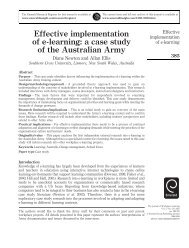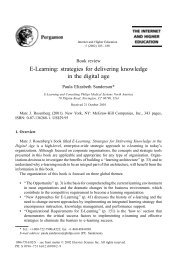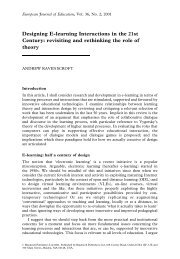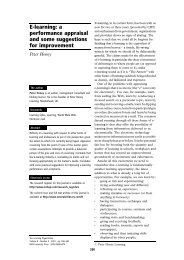Ùسخة pdf - جا٠عة اÙÙدس اÙÙ ÙتÙØØ©
Ùسخة pdf - جا٠عة اÙÙدس اÙÙ ÙتÙØØ©
Ùسخة pdf - جا٠عة اÙÙدس اÙÙ ÙتÙØØ©
Create successful ePaper yourself
Turn your PDF publications into a flip-book with our unique Google optimized e-Paper software.
Teachers’ and Supervisors’ Perspectives of the Ministry of<br />
Education National Teacher Professional Development Standards<br />
in Enhancing Jordanian EFL Teachers’ Professional Development<br />
Tha’er Tawalbeh<br />
better. Another way is to improve the conditions under which they work such<br />
as reducing their teaching load, giving them more time for planning, fewer<br />
students and more aids. A third way is by relieving them of psychological<br />
discomfort of one kind or another. That is by helping them adapt to the demands<br />
of work. This involves giving the encouragement, support, sympathy, and<br />
respect. By this teachers will be able to handle the psychological stress of<br />
their work.<br />
Clark (1992) argues that the responsibility should be given to teachers<br />
themselves to develop professionally. Here, he means self- directed<br />
professional development. The reasons beyond this argument are that adult<br />
development is voluntary- no one can force a person to learn. When adults<br />
feel that they are in control of a process of change that they have voluntarily<br />
chosen, they are much more likely to realize full value from it than when<br />
they are forced into training situations where they have little to say or<br />
do. Another reason is that each teacher is unique in important ways; it is<br />
impossible to create a single, planned program of professional development<br />
that will meet everyone’s needs and desires. It is good to support teachers in<br />
following an approach to lifelong learning. Thus, teachers must begin to think<br />
of themselves as designers; they must plan, select, sketch, make errors, and<br />
learn from experience. In view of recent developments in teachers’ roles, and<br />
in light of the information revolution and the challenges of the 21 st century, it<br />
is necessary to develop teachers’ competencies. Teachers need to be equipped<br />
with the critical thinking skills and knowledge required to respond effectively<br />
to these challenges.<br />
The Ministry of Education in Jordan started a plan in 2003 to reform the<br />
educational system. A major component is concerned with the transformation<br />
of education programs and practices to achieve learning outcomes relevant to<br />
knowledge economy. One of the means to achieve this is teachers’ professional<br />
development. This implies that increased attention should be paid to raising<br />
the level of teachers and develops their professional skills.<br />
The Ministry of Education (2006- A) stresses that the teacher is the<br />
primary facilitator and manager of individual learning within the reformed<br />
educational system. It recognizes that the quality of the teaching staff and<br />
the changing role of the teacher are critical to the success of the educational<br />
reform program. Rather than a provider of knowledge, the teacher is becoming<br />
a facilitator and assessor of learning who carefully manages the progress of<br />
13
















